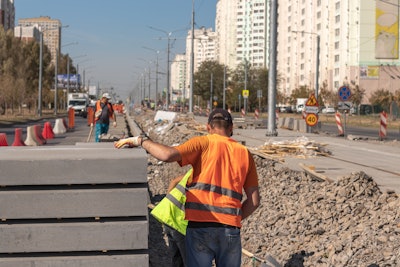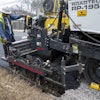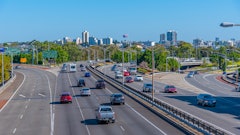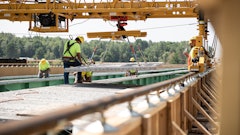
If you work in the blacktop industry long enough, you may eventually find yourself exploring some money making opportunities beyond the confines of the private commercial properties market. The good news is that there are usually a lot of different types of jobs that you can bid on in the public sector.
While it is true that, sometimes, larger cities have their own pavers, rollers, or excavators, as well as crews to run them, it is far more common that your local municipalities do not. The trouble for them is that they still have lots of asphalt that needs fixing and maintaining.
Each locality has its own specific methods and processes for contractors to get involved. However, while attending the recent Public Works Expo 2025 (PWX) in Chicago, IL, I decided to stop and talk to a handful of city works employees and get a sense of what they wish pavement maintenance contractors knew about their side of the work before getting involved.
So here is what they had to say, and, perhaps, things you should think about the next time you're putting down some blacktop for Uncle Sam.
What are the biggest challenges you face in your role maintaining the roadways and surfaces for your city?
Steven (Miramar, FL): The biggest challenge we face is funds. We always have a limited amount of funds [in comparison] to the work that is available.
Miles (Calgary, Canada): Chronic underfunding is number one. I'm from Canada, so we have 16,000 Lane kilometers of roadway, and we can't keep up with the with the pavement maintenance. The potholes are, you know, getting very challenging to keep up with. And we are also in a cold weather climate, so we have freeze-thaw, and so that breaks the asphalt and causes more potholes than a warm weather city experiences over the course of a year. So, that's like some of our biggest challenges.
Ashley (Durham, NC): It's the budget, the budgets are so small.
Jason (Newport News, VA): Trying to make sure we have enough people, everybody is experiencing that. After [staffing] I'd say it's the budget.
While it isn't necessarily a surprise, it is interesting to see that the biggest stated problem continues to be funding. For the last few years, I've been operating under the assumption that the IIJA and IRA flooded the country with money for infrastructure spending. The reality is that it has and it hasn't.
No specific estimate is available for the exact amount of Infrastructure Investment and Jobs Act (IIJA) funding that has reached smaller localities. The distribution is not transparent due to complex funding streams, challenges faced by small towns, and the filtering of funds through state and other intermediaries.
Additionally, smaller cities and towns don't have the resources or experience to navigate the sometimes maze-like bureaucracy that is often required to win special awards and grants for city improvements. According to the Urban Institute, localities with more staff and bigger budgets are more likely to win federal grants.
What are the types of projects that are first to be eliminated from your "maintenance wish lists" when these budgets are finalized?
Steven: It ends up being what the most recent concerns are. Because if we're getting more calls [and complaints] for one particular road versus more requests for the condition of a different road, then it will be placed on the [repair] profile. The other things fall to the bottom.
Miles: Anything that's on a low volume roadway is usually the first to get cut. We try to focus on our higher volume roadways, which, of course, impact more citizens. We try to get that work done as best we can, but anything that's on a collector road or residential road that usually gets pushed to the back of the list and citizens, although they're a little lower volume roadways, they care about the road they drive on that's in front of their house, and they can be quite noisy and don't quite understand [these are the] decisions we have to make.
Ashley: First? I'd like to say, sidewalk repairs and then [residential] street repairs.
Jason: We keep a five year list of what we want to do, maintenance wise. We adjust that list accordingly, depending on how much [and] what are the types of projects -- they get sometimes adjusted to lower priority -- it would be like a resurfacing project. You know, obviously if the roads in critical shape, it wouldn't get pushed, right? In a perfect world, you always want to do preventive maintenance before it gets to that.
It's a shame that most of the finances that are available for cities seems to be focused on the larger infrastructure repairs while the places where people actually live are often left off the list. This is something my home state of Ohio is also going through.
The city of Akron, OH received more than $11 million dollars in recent federal grants to improve roadways, including a project approved under the "reconnecting communities" fund created by the IRA. However, some local residents are complaining that they've received bills for residential resurfacing projects this year conducted by the city. Reports have indicated these bills range from a few hundred dollars up-to two thousand dollars.
These "special assessments" are nothing new, but they are a controversial and divisive method of bridging tax income shortfalls for citiea. However, Akron passed a general tax increase in 2017 that targeted the city's pavement maintenance. To the people living in already underserved neighborhoods, who want, need, and deserve safe, well maintained streets, getting a bill from the city can be devastating.
What would you like private sector contractors to know the next time they do work for their local city?
Steven: I think the biggest issue, most of the time, is scheduling. Because most of the time, they take up more [work] than what they can manage, and [contractors] will give you dates and deadlines and are not able to follow through for one reason or another. So, I kind of wish like they could be a little bit more precise, a little bit more consistent.
Miles: I think, probably, the interaction with the public would be the big one. When we're dealing with resurfacing a roadway or repairing potholes, there's a lot of interested parties, right? You've got pedestrians, you've got cyclists, neighbors, and property owners and so on. And for the contractor, they're just there to do a job and get it done, whereas we have to manage the interaction community. So, I would say that's probably the number one issue.
Ashley: I wish that they understood the priority [of the work]. I understand they are a business, and their priority is making money for their business. We have to prioritize the community [first].
Jason: That I know how much it costs to pave asphalt so why are you charging so much [starts laughing]? We need them to be a little bit more realistic here. I know they have probably had the same challenges as us. You know, as far as staffing and equipment. They're the same challenges everybody is facing.
For more about the Public Works Expo 2025, checkout our highlights from the show!













![Lee Boy Facility 2025 17 Use[16]](https://p1-cms-assets.imgix.net/mindful/acbm/workspaces/default/uploads/2025/09/leeboy-facility-2025-17-use16.AbONDzEzbV.jpg?ar=16%3A9&auto=format%2Ccompress&fit=crop&h=135&q=70&w=240)






